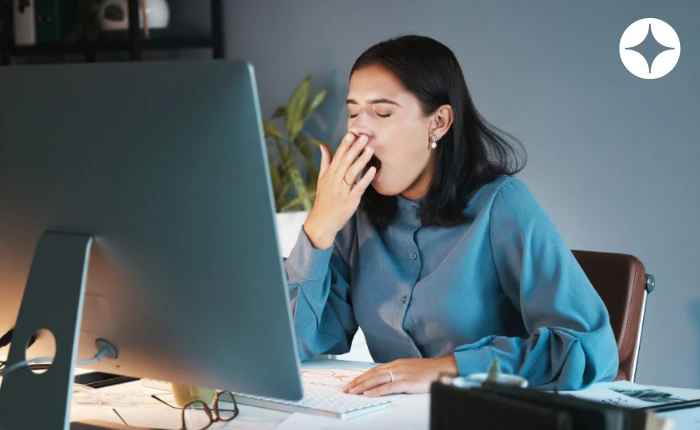
Consistent, high-quality sleep is necessary to maintain good physical and mental health1. Adults should aim for at least seven hours each night for healthy mental function, elevated mood, heart health, and more. Sleep deprivation, on the other hand, can lead to anxiety, depression, memory problems, and severe physical health consequences2 if left unaddressed.
Poor sleep has far-reaching consequences for every aspect of daily life, including work performance3. Lack of good sleep causes employees to struggle to stay awake, have poor concentration, and fail to meet high performance standards. Making matters worse, job strain is also known to impact sleep negatively, creating a cycle of stress and sleep disruption. Keep reading to learn more about the effects of work stress on sleep and what to do about it.
The Impact of Work-Related Stress on Sleep Quality
Most workers agree that job strain is getting worse, with 65% of U.S. workers4 reporting their job as a significant stressor. Many positions demand longer hours and continue to increase workloads. The pressure of more responsibilities and less downtime is taking a toll on employee health and causing cases of burnout5 to skyrocket.
A nine-year study of 1721 participants measured the correlations between job strain and sleep disturbances6, finding that on-the-job stress significantly damaged sleep quality. Sleep problems not only caused worsened job performance but also increased the risk of workplace accidents and injuries.
The study suggests that early workplace interventions to alleviate stressors can improve sleep for employees. However, it is ultimately up to each person to remain aware of the source of their worries and take steps to improve their stress monitoring and management7 through physical exercise, breathing exercises, mindfulness, sleep hygiene, and other practices that promote mental well-being.
Reduce Sleep Disturbances Caused by Job Strain with Good Sleep Hygiene
Although it's not possible to eliminate or fully control the stress that comes with work, awareness is the first step toward making improvements that reduce sleep disturbances. Efforts to manage stress and create the ideal sleep environment can enhance sleep and make it easier to cope with job-related strain. Try implementing these sleep hygiene habits8:
References
- Stick to a regular sleep schedule.
- Avoid caffeine, alcohol, and nicotine close to bedtime.
- Eat a diet of nutrient-rich foods.
- Get regular exercise.
- Go outside for sunlight exposure.
- Practice stress management techniques.
- Minimize noise in the bedroom.
- Block out outside light with room-darkening curtains.
- Ban blue light-emitting electronics from the bedroom.
- Keep the room temperature cool and comfortable.
- Try aromatherapy for relaxation.
- Invest in a supportive and comfortable mattress.
- Use cozy sheets, blankets, and pillows.
- Start a bedtime routine to wind down, relax, and prepare both mind and body for sleep.
- Avoid daytime naps that can interfere with nocturnal sleep.
It takes time to establish a sleep hygiene routine that delivers results. Success depends on making gradual adjustments and staying consistent. Over time, these tips can greatly improve sleep quality, resulting in more energy and sharper focus throughout the workday. Anyone who experiences long-term sleep disturbances should also talk to their doctor to rule out underlying causes, especially if they are severe or don't improve with adherence to proper sleep hygiene.
References
- Sleep Foundation – 8 Health Benefits of Sleep
- Sleep Foundation – The Link Between Sleep and Job Performance
- Division of Sleep Medicine Harvard Medical School – Make Changes at Work
- U.S. Department of Labor – Workplace Stress
- American Psychological Association – Burnout and stress are everywhere
- Wiley Online Library – Alternative Formulations of Job Strain and Sleep Disturbances: A Longitudinal Study in the United States
- National Library of Medicine – Improving Stress Management and Sleep Hygiene in Intelligent Homes
- Sleep Foundation – Mastering Sleep Hygiene: Your Path to Quality Sleep




